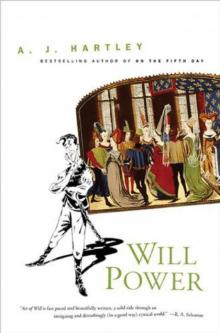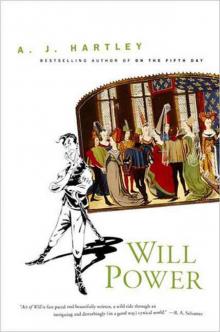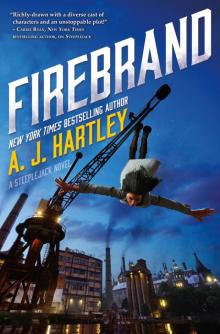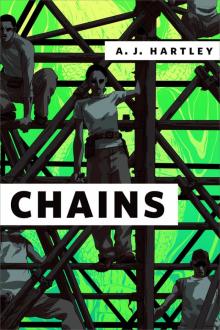- Home
- A. J. Hartley
The Mask of Atreus
The Mask of Atreus Read online
AN ANCIENT DEBT COLLECTED
If they were what they appeared to be, this had to be the largest, richest collection of Mycenaean or Minoan artifacts outside the National Archaeological Museum in Athens. Its value was impossible to estimate.
A collection of this size just couldn’t exist. Most of the Greek sites had been excavated or plundered centuries before. A collection like this, unknown to modern archaeological science, was unthinkable.
But Deborah knew at a glance that what she was looking at were not copies or reproductions of known pieces. If this stuff was real, it had been stolen, kept secret, traded outside the purview of the archaeological community, squirreled away, its lessons and delights for private consumption. She felt only dread and a disappointment that left her drained and hollow, even stopping her tears with a sudden and emptying weariness.
“Richard.” She sighed. “What did you do?”
Why didn’t you tell me?
She remembered his old Indiana Jones-esque righteous indignation: “This belongs in a museum.” Quite. She looked at him again, lying there, pale and unfamiliar, striped and splashed with the garish red of his blood.
You were my friend, my mentor…
Richard had been dealing with the worst kind of illegal artifact traffickers and they had turned on him. What other way was there to read the evidence?
Praise for
The Mask of Atreus
“This is exactly the kind of archaeological thriller I love—from its gripping opening on a battlefield in the waning days of World War II to its roaring finish. The Mask of Atreus is rich and dramatic—a compelling novel that will grip you in its swift, dark currents and sweep you over the falls… outstanding.”
—Douglas Preston, author of
The Codex and Tyrannosaur Canyon
“The Mask of Atreus is the perfect debut—a high-octane thriller crammed full of long-buried secrets, treacherous betrayals, jaw-dropping twists, and a healthy dash of romance. Deborah Miller is an engaging, sympathetic heroine, who you can’t help but root for. Move over Michael Crichton—A. J. Hartley is right at your heels.”
—J. A. Konrath, author of
Whiskey Sour and Bloody Mary
“Intriguing. A labyrinth of history and mystery.”
—Steve Berry,
New York Times bestselling author of
The Templar Legacy
THE BERKLEY PUBLISHING GROUP
Published by the Penguin Group
Penguin Group (USA) Inc.
375 Hudson Street, New York, New York 10014, USA
Penguin Group (Canada), 90 Eglinton Avenue East, Suite 700, Toronto, Ontario M4P 2Y3, Canada (a division of Pearson Penguin Canada Inc.)
Penguin Books Ltd., 80 Strand, London WC2R 0RL, England
Penguin Group Ireland, 25 St. Stephen’s Green, Dublin 2, Ireland (a division of Penguin Books Ltd.)
Penguin Group (Australia), 250 Camberwell Road, Camberwell, Victoria 3124, Australia (a division of Pearson Australia Group Pty. Ltd.)
Penguin Books India Pvt. Ltd., 11 Community Centre, Panchsheel Park, New Delhi—110 017, India
Penguin Group (NZ), Cnr. Airborne and Rosedale Roads, Albany, Auckland 1310, New Zealand (a division of Pearson New Zealand Ltd.)
Penguin Books (South Africa) (Pty.) Ltd., 24 Sturdee Avenue, Rosebank, Johannesburg 2196, South Africa
Penguin Books Ltd., Registered Offices: 80 Strand, London WC2R 0RL, England
This is a work of fiction. Names, characters, places, and incidents either are the product of the author’s imagination or are used fictitiously, and any resemblance to actual persons, living or dead, business establishments, events, or locales is entirely coincidental. The publisher does not have any control over and does not assume any responsibility for author or third-party websites or their content.
THE MASK OF ATREUS
A Berkley Book / published by arrangement with the author
Copyright © 2006 by Andrew James Hartley.
Cover and stepback art by axb group.
Cover design by Rita Frangie.
Interior text design by Stacy Irwin.
All rights reserved.
No part of this book may be reproduced, scanned, or distributed in any printed or electronic form without permission. Please do not participate in or encourage piracy of copyrighted materials in violation of the author’s rights. Purchase only authorized editions.
For information, address: The Berkley Publishing Group,
a division of Penguin Group (USA) Inc.,
375 Hudson Street, New York, New York 10014.
ISBN: 1-4295-0645-8
BERKLEY®
Berkley Books are published by The Berkley Publishing Group,
a division of Penguin Group (USA) Inc.,
375 Hudson Street, New York, New York 10014.
BERKLEY is a registered trademark of Penguin Group (USA) Inc.
The “B” design is a trademark belonging to Penguin Group (USA) Inc.
To Sebastian,
first revealed to us by cyber-oracle in Delphi…
ACKNOWLEDGMENTS
The author would like to thank the following:
People who have supported my writing in the past:
Jane Hill, David Raney, Jaime Cortez, Alan McNee, Douglas Brooks-Davies, Jonathan Mulrooney, and—especially—Stacey Glick, who never gave up.
People who contributed directly to this novel by reading it or supplying valuable information:
Gary Hibbert, Kimily Willingham, Cary Mazer, Ron Tipton, Jonathan Brenton, Natalee Rosenstein, and the National Archaeological Museum in Athens.
People who did both:
My brother, Chris; my parents, Frank and Annette; and—above all—my wife, whose patience with my persistent scribblings defies description and belief.
PROLOGUE
Germany, 1945
Andrew Mulligrew clamped the radio’s headphones tighter to his head. He must have misheard. Given the roaring of the Sherman’s engine, it was amazing he could hear anything.
“Say again?” he shouted.
“German column heading south fast, directly ahead,” the commander repeated. “Armored car lead, then something big, turretless. Maybe a Jagdpanther.”
Mulligrew’s heart sank. That was what he thought he’d heard. Even over the clank and squeal of the tank’s wheels, he could hear the silence in the radio static. Somebody, maybe Williams over in The Highwayman to his left—the whole platoon had names stenciled on their hull noses—asked what else was in the convoy. His tone was balanced between resignation and dread.
“Couple of trucks, a half-track, at least two other tanks, probably a panzer four and a panther.”
Four Shermans, thought Mulligrew, one of them moving at half speed, and two Stuart M5s armed only with thirty-seven mill canons, against the finest German armor including one tank they couldn’t hope to touch unless they got close enough to spit on it. Every one of the German tanks had guns that could stop them cold at five hundred yards. The Jagdpanther would rip them apart at three times that distance.
What in God’s name were the Krauts doing sending a prime platoon south like this when they were using every last man and machine to delay the Allied pincer in the north? Berlin was falling, perhaps already had, but a crack unit had been allowed to hightail it south, straight—God help him—into the path of his battle-weary platoon.
Mulligrew’s tank and the rest of the platoon had been separated from the rest of the 761st Tank Battalion as they pressed east through Regensburg on the Danube five days earlier. They were seventy-five miles or so northeast of Munich, less than that from both Austria and what had been Czechoslovakia before the Nazi carve-up, not much more from the Swiss border. It was spectacular
country, all wooded mountains with snow-capped peaks and distant, romantic castles. One moment they had been rolling along with the rest of the group, finally starting to believe that their nightmarish slog from Normandy through the Ardennes into Germany was coming to a victorious end, and in the next they had been pinned down by enemy artillery. Mulligrew’s platoon had been ordered to peel off to cut enemy supply lines, but two days later, they had found themselves completely alone. The rest of the battalion had been ordered on at their best speed, rushing with the rest of the army to Steyria on the Enns River to meet—somewhat anxiously—with the Russians.
Mulligrew and the rest of the company had made the approach north by themselves, and apart from dealing with roads jammed with refugees, he had started to think they had gotten the softer deal. Since Regensburg they hadn’t fired a shot and were starting to believe they might fire no more. By all accounts, the war was over.
Now this.
Mulligrew switched to the tank’s internal circuit and started yelling orders, swinging the nose of the Sherman around, and calling for armor-piercing rounds. They had just got off the road when they saw the armored car coming their way. It was doing at least fifty miles an hour and skidded badly as it struggled to find cover, its turret guns opening up so that they could hear the machine gun rounds kicking off the Sherman’s turret. But it was what he could see behind the armored car that drained the life from his face.
The Jagdpanther was huge, low and menacing like a crocodile or a shark, and its frontal armor was well sloped and several inches thick. Even at close range the Sherman’s 76 mm weapon had no chance against it. And if the German tank could get its 88 trained on them, they were dead. Simple as that.
Mulligrew screamed to get the tank into the field and the turret swung round. Their only chance was to slip past the Jagdpanther and hit it—several times and at close range—from the side. The Shermans behind him would have to deal with the other German tanks.
They were coming up out of the ditch by the roadside when the 88 fired, a great blast of smoke and muzzle flash filling Mulligrew’s visor so that he winced away involuntarily. It took him two full seconds to be sure they weren’t hit. Then he was screaming the order to fire, conscious even as he did so that Williams’s turret had taken the full brunt of the 88, tearing a hole the size of a trash can lid in the front, the shell ricocheting around inside…
Seventeen long minutes later, Mulligrew stood on the back of the German truck and gazed out over the smoking ruins that littered the road and fields around it. Two of the Shermans and one of the Stuarts had been knocked out; a third had been badly damaged. Williams and all but one of his crew were dead, so were Smith, Jenkins, and Pole. Rogers had lost a leg, and Lumpkin was blind in one eye. Both of them thought they’d got off easy.
The Germans had barely stopped. Instead of repositioning, digging in, and picking them off with their superior weapons, they had tried to just push through, like they were desperate to keep moving. As the Shermans had fanned out to try to hit their flanks, they had done nothing to adjust, still pushing south, exposing even the sides and rear of that monstrous Jagdpanther, a tank that probably could have dealt with the entire platoon if it had hung back and made them come to it.
It made no sense.
And then there was the way that, as the battle had started to turn in favor of the Americans, the Germans had hemmed in this one truck, squeezed together around it as if determined to make sure that if only one vehicle made it out in one piece, it would be that battered little Opel.
“Let’s see what was worth all that,” Mulligrew said.
Tom Morris, Mulligrew’s driver, unhooked the latch on the back of the truck. His face was blank, his eyes wide with the shock of the battle and its strangeness.
Mulligrew swung himself up, climbing over the young German who had tried to hold them off with a machine pistol until they had riddled the truck with .30 caliber rounds. Inside was a single large crate, stenciled with a German eagle and swastika. He took the pickax from the side of his tank, worked it under the top of the box, and leant his weight on it until the pine splintered and tore. Then he pushed it aside and became quite still, staring in silence.
What the hell?
“What is it, Andrew?” said Morris. “What do you see?”
“I don’t know,” said Mulligrew, his voice hoarse with puzzlement, even fear. “I don’t know. Pretty wild stuff.”
“What is it?”
“You’d better call the MPs,” said Mulligrew. “Right now.”
And though they did so, and even in spite of the carnage they had just endured and the grief which pursued the initial horror, Mulligrew never moved from the back of the truck. He was still standing there, staring as if spellbound, when the ambulances arrived to remove the dead.
PART I
Old Bones
“Furthermore, his wounds, yes, every one he had (and many men cut him with their weapons of bronze) have closed, showing how much the blessed gods still love your son, though he is now nothing but a corpse…”
“Respect the gods,” the old man replied, “and pity me in memory of your own father—though I am more to be pitied, since I have kissed the hand of the man who slew my son.”
—Homer, The Iliad, Book 24
CHAPTER 1
Present Day
The big man leaned against the wall, his still-substantial weight on the foot he had so casually braced against the doorjamb.
“You’re a very striking young lady, you know, Miss Miller,” he drawled, his eyes slitting in his piggy face and his tongue showing wetly through his thick, parted lips.
“I know,” said Deborah. She was six feet and one inch tall and looked like she’d been assembled out of pieces of pipe. She rarely got called attractive. Never pretty. Striking, she heard plenty. In the past she might have been flattered. A long time ago. Tonight, after the weeks of planning and the evening’s hours of fixed smiles and indulgent conversation, she was too tired to be polite, even to Harvey Webster, prominent member of Atlanta’s League of Christian Businessmen and the head of the museum’s financial board. It was after midnight, and she wanted to go home.
“Very striking,” he repeated, extending a hand toward her hip, palm open. He was toad-shaped, his skin managing to both bulge and sag simultaneously like a balloon half full of water, sloshing from side to side.
“Mr. Webster,” she said, eyeing the liver-spotted hand he was sliding toward her, “I don’t think that would be wise.”
And, she thought, I’d probably throw up if you touched me.
His hand hovered; then, as if he had decided to read her rebuttal merely as coyness, it started toward her again. She flinched away.
“Mr. Webster,” she said, her smile a little weary now. “Please.”
He changed tack, his leer opening into a smile, his hand retreating upward in a gesture of surrender.
“Far be it from me to give offense,” he said, the smile spreading wider than the doorway he was still blocking. “I had just hoped you could give me a tour. Now that, you know, everyone’s gone home.”
The smile stalled for a second, and Deborah glimpsed the calculation behind it. It was uncanny how, for a sixty-five-year-old man, he oozed the smugness of a high school jock. Smugness and, she thought, a touch of menace.
“A private tour,” he added, smirking so that it was impossible to misread what he meant.
He had been like this all night and, if she was going to be honest, was always like this, particularly after a few drinks. She thought of herself as a fairly tolerant person, but if she had a rope, she was nearing the end of it.
“Another day, Mr. Webster,” she said. “When it’s light and crowded and I have had the chance to invest in a decent cattle prod.”
She grinned to show she was joking, but his smile curdled a little all the same.
“You have a smart mouth, Miss Miller,” he said.
“Thank you,” she said, embracing the fact that she
just couldn’t win with him tonight, “though it’s not my mouth that’s smart.”
He sighed and raised his pasty hands in mock surrender.
“OK,” he said, smiling again. “I’ll be heading home.”
“Drive carefully,” she said, shrugging slightly aside as he made one last attempt at an embrace.
“I’ll be in to see Richard later in the week, so… till then.”
He stepped back through the glass door, still looking at her as if expecting her to change her mind and invite him back in.
“Good night now, Mr. Webster,” she mouthed, adding to herself, You drunken, lecherous, old slug.
She felt a ripple of relief as he walked off into the darkness outside, though she guessed that forcing the old man’s retreat might cost her something, maybe more than she realized. Webster controlled the museum’s purse strings, and he was influential in the local business community, or an elderly, white section of it, at least. The League of Christian Businessmen didn’t openly ban black members, but for an organization of its type to have none—particularly in a city like Atlanta—was suggestive. Deborah had tried to balance the League’s presence at the museum with comparable organizations which had a more diverse membership, but it didn’t stop her from feeling uncomfortable every time they sent a check. She could probably get a Jewish business group involved, she thought, but that made her uncomfortable too, as if that would be exploiting her heritage, a heritage she did her best to disregard in every other aspect of her life. Why risk exposing herself and the museum to anti-Semitism when the vast majority of her Jewishness was ancient history anyway?
Oh please, said a voice in her head. Webster probably doesn’t even know you’re Jewish.

 Will Power wh-2
Will Power wh-2 Hamlet, Prince of Denmark
Hamlet, Prince of Denmark Will Power
Will Power Firebrand
Firebrand A Novel
A Novel Chains
Chains Guardian
Guardian Darwen Arkwright and the School of Shadows
Darwen Arkwright and the School of Shadows Act of Will
Act of Will Darwen Arkwright and the Insidious Bleck
Darwen Arkwright and the Insidious Bleck What Time Devours
What Time Devours